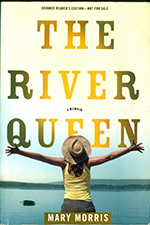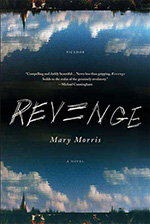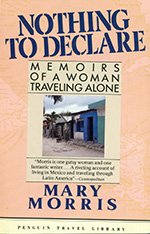
Yesterday Larry and I went to a beautiful wedding. It was way uptown at the Union Theological Seminary. Held in a magnificent chapel, the guests sat in a circle and the minister said some moving things about why we were sitting in a circle, rather than in the tradition type of seating. How we were encompassing the bride and groom in a circle of love. It sounds a little hookey as I write this, but the way it was said...we were all touched.
After the reception Larry and I left by a backdoor. If we'd gone out the way we'd come in then what follows would never have happened, but we came out on to, I believe, Claremont Avenue and right in front of us was the Riverside Church.
When I was a graduate student at Columbia, I went to this church all the time. I'd go just to sit and be quiet or to hear a concert. I'd go for a lecture and occasionally a memorial service. But Larry had never been inside. It was a beautiful early evening and we had no other plans. We weren't in a hurry to get home. "Would you like to see the chapel?" I asked him.
Now we aren't big on churches. We don't really visit them in Europe the way other people do. I generally find them rather cold, impersonal places, but I've never felt this way at Riverside (Or at Chartres or Notre Dame or a few others either). At any rate we went in. The receptionist told us we only had a little time. So we climbed the stairs.
Once inside we were almost the only people there. There weren't any worshippers, it seemed. Just a few tourists with their cameras flashing and some rather loud group that seemed to be church officials. We sat in the middle, staring at the deep blue stained glass; the stone-carved altar, all done, I believe, by one man.
As we were sitting, I heard music. A recording, I assumed, of a piano sonata or concerto. A deeply romantic, powerful sound engulfed the hollow of the church. I was looking for a speaker and wondering why they'd put music on, just as the church was about to close.
A man approached us. He had a portfolio in his hand. He thought we were tourists, which I suppose in a way we were, and he started lecturing to us about the history of the church and showing us pictures he drew of the faces at the altar.
But I was still drawn to this music. Was it Horowitz? Emanuel Ax? Was it Rachmaninoff? Chopin? I wanted to know. Then as the man was lecturing to us, I noticed that right ahead of me, perhaps twenty rows from where I was seated, a young man was seated at the Steinway grand piano. He had pulled the cover back a little and, in fact, he was playing.
I excused myself to the man who was giving us the history of the altar sculpture and made my way up to the front rows. I quietly took a seat and watched as this young man, perhaps in his mid to late 20's played with as much grace and talent as I'd ever heard anyone. His girlfriend stood behind him. She smiled at me as I sat down.
Larry followed a few moments later. He sat behind me. I assumed that this young man was practicing for some performance later that evening. That he was testing the piano. Whatever he was doing, it didn't matter. I was sitting just few away from a master and I found myself propelled into whatever that space is - that kind of timeless, opened ended space - where art can take us.
Proust, of course, wrote about this. When Swann is transported by that little piece of music that makes him fall in love with Odette (a woman who was not "even to my taste; wasn't of my style"). So I was having one of those Proustian moments - not falling in love with a man, but with a moment.
Then we heard the shouting. "You gotta stop. I'm gonna lose my job." A woman in a guard uniform came racing up. "You can't do that. I'm gonna lose my job." She had some kind of clamps in her hand and the young man, nodding at her, asked for just a few more minutes. "You can't have another second. I gotta lock this thing up." And she proceeded to clamp the piano down.
With that the man stopped and stepped away. It was then that I realized that he had just decided to play that piano in the Riverside Church. He had pulled back the cover on that Steinway and began.
"Excuse me," I said to him as he rose, "but can you tell me what you were playing?" He said it was a Liszt sonota, for B minor. A thirty minute piece. "That was only a small part of it," he told me.
"So is this what you do?" I asked him as he rose. "Are you a concert pianist?" He nodded, taking his girlfriend's hand.
"Yes..." he replied, "Unfortunately."
"Unfortunately..." I wanted to ask him why he said that, but of course I understood. I know how art can be as much a curse, and perhaps more so, than a blessing.
This moment recalled another. I am a girl myself, not much older than this young man. I am on a train going from Lyons to Milan and a man sits across from me. He is old and tired and he has a very bad hip. His face is filled with suffering and pain. He begins to talk to me. He is a musician. He hates the musical life. He is always on the road. Never with his family. His misery just seems to go on and on. When we reach Milan, he tells me his name. "Antonio Janigro." At that time, along with Pablo Casals, one of the world's most famous cellists.
So I understood why he said unfortunately. I've said this myself too from time to time. I am a writer...alas. A blessing, yes, but at the same time, a curse.
Larry and I strolled out behind them. As we walked, I thought to myself how any time we take a detour, any time we are surprised, it is a kind of journey isn't it.
And at the same time, Henry James echoed through my mind. His words on the artist. "We work in the dark. We do what we can. We give what we have. Our doubt is our passion and our passion is our task. The rest is the madness of art."
We seemed to be following the young couple as they walked,arm in arm, through the Sakura Park just across from Riverside Church. But we weren't. We were walking the same too, just behind them as they turned off and disappeared into the International House. The student residence where, once, in another life it seems, I was a student too.










Lady Morris,
ReplyDeleteOnce (maybe a year later, or more) I wrote you a comment related to your post on Henry Miller's "The Colossus of Marousi", do you remember it? (I am from Brazil, if it may help...) Since then I used to read your blog - a nice one, by the way.
This post touched me. I am an artist too. And, also, "alas". I write (poetry, essays, journal), I play (acoustic and electric guitar and some other instruments). I graduated and post-graduated on Philosophy (alas!). I even did a Master on Literature (alas! alas! alas!). I am telling this just to say that I do compreehend what that young pianist said to you, with a resignation in his face.
You are right: Art is a blessing and a curse at the same time.
But my relation with your post don't end here. You quoted Henry James (another Henry), and it was the same quotation that was in the work I researched in my Master ("O Encontro Marcado", or, in its the English version, "Time to Meet", by the brazilian writer Fernando Sabino [1923-2004]). This coincidence touched me too. It was very curious, don't you think?
I think that you wrote a very poetical post, like many others you also wrote laudably (this adjective sounds old-fashioned? I caught it in the dictionary!).
Well, I hope that I was not betrayed by my skills in English language). After all, I do what I can, give what I have... and the rest is the madness of art.
Friendly yours,
Marcelo.
(Second version, with some corrections. Please, discard the first one.)
ReplyDeleteLady Morris,
Once (maybe a year later, or more) I wrote you a comment related to your post on Henry Miller's "The Colossus of Marousi", do you remember it? (I am from Brazil, if it may help...) Since then I used to read your blog - a nice one, by the way.
This post touched me. I am an artist too. And, also, "alas". I write (poetry, essays, journal), I play (acoustic and electric guitar and some other instruments). I graduated and post-graduated on Philosophy (alas!). I even did a Master on Literature (alas! alas! alas!). I am writing this just to say that I do compreehend what that young pianist said to you with an expression of resignation in his face.
You are right: Art is a blessing and a curse at the same time.
But my relation with your post don't end here. You quoted Henry James (another Henry), and it was the same quotation that was in the work I researched in my Master ("O Encontro Marcado", or, in the English version, "Time to Meet", by the brazilian writer Fernando Sabino [1923-2004]). This coincidence touched me too. It was very curious, don't you think?
I think that you wrote a very poetical post, like many others you also wrote laudably (this adjective sounds old-fashioned? I caught it in the dictionary!).
Well, I hope to have not been betrayed by my skills in English language. After all, I do what I can, give what I have... the rest is the madness of art.
Friendly yours,
Marcelo.
MARY!
ReplyDeleteI love this post, so beautiful.
Much love to you,
Nola
oh another reason why I love Paris, it is not that important as the others though is the weddings, the most beautiful weddings I have ever seen and participated in all the places I have been
ReplyDelete